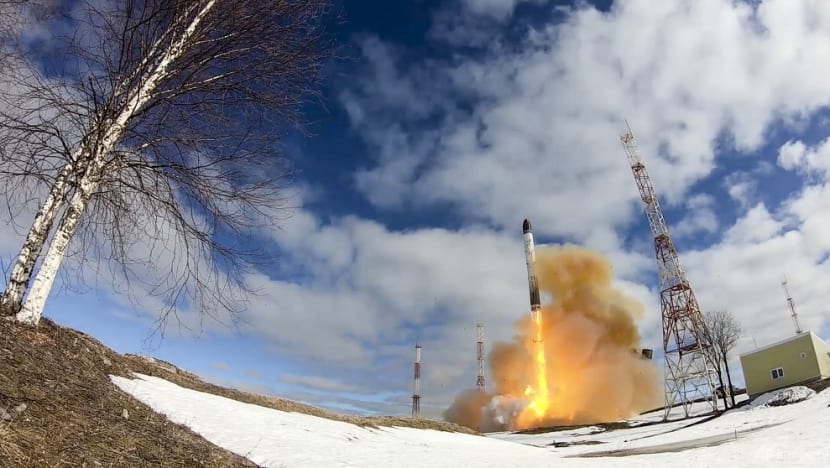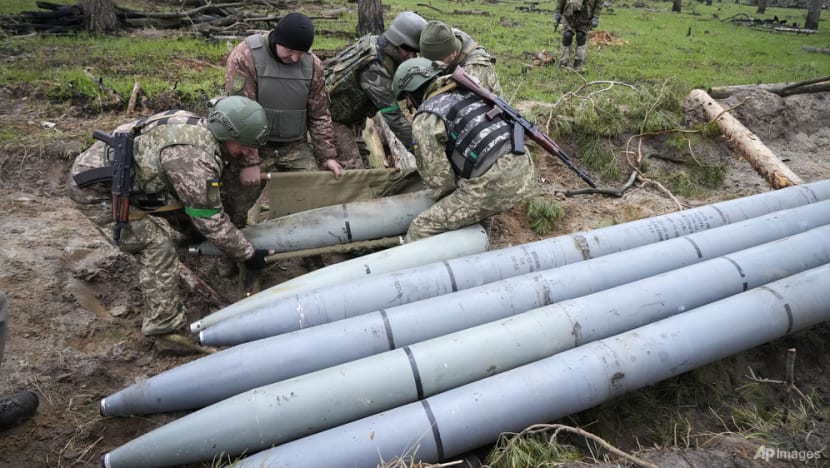Commentary: How will the West react if Putin is not bluffing about nuclear weapons?
The world is entering its most dangerous period since the 1962 Cuban Missile Crisis and the West needs to be ready with a response if Putin makes good on his threats to use nuclear weapons in the Ukraine war, says the Financial Times' Edward Luce.

WASHINGTON DC: Russian President Vladimir Putin’s willingness to threaten to use nuclear weapons is, in one respect, a good sign: It means that Russia is probably losing in Ukraine.
It is also a potentially catastrophic one. If Putin’s aim is to scare the West, he is failing. The North Atlantic Treaty Organization (NATO) keeps stepping up its supplies to Ukraine.
The question is what he would do if he thought Russian defeat was inescapable. Putin keeps implying he knows exactly what steps he would take. Is he bluffing? It is plausible that even he does not know the answer.
Either way, the genie is out of the bottle. Putin has broken a post-Cuba taboo on threatening to go nuclear. That, in itself, puts us in new territory. Without most people being aware of it, the world is entering its most dangerous period since the 1962 Cuban Missile Crisis.
THREAT OF NUCLEAR WAR HIGHEST SINCE COLD WAR
The majority of those under the age of 50 have grown up thinking that the nuclear spectre is a relic of the last century. In the past few weeks, the prospect of a nuclear exchange has become the most live threat to this century’s peace.
In terms of public awareness, the debate about Putin’s language is a good example of “those who don’t know talk, and those who know don’t talk”. It is easy to think of Putin as a poker addict trying to bluster his way out of a bad bet.
Eventually, he must fold. United States civilian and military officials suffer from no such complacency. Many have taken part in war game exercises where the use of low-yielding tactical nuclear weapons as often as not escalates to strategic nuclear exchange – doomsday, in plain English.
If there were a 5 per cent chance of Putin detonating a battlefield nuclear weapon, the world would be at more risk than at any point in most people’s lifetimes. In the past few days, Moscow’s signalling has arguably raised the chances to one in 10.
VLADIMIR PUTIN'S WORDS ARE NOT JUST EMPTY THREATS
Putin described last week’s test of the Sarmat hypersonic intercontinental ballistic missile as giving the West “food for thought”, which would not sound out of place from Blofeld, the 20th-century Bond villain.
On Wednesday (Apr 27), Putin said: “We have all the instruments for this (responding to an existential threat to Russia) – ones nobody else can boast of. And we will use them if we have to.”
The natural response is that US President Joe Biden and his European counterparts have made it plain NATO will not fight in Ukraine. The West, in other words, poses no “existential threat” to Russia – its threshold for use of nuclear weapons.
But that is only how the West sees it. Putin’s threats, and those of his officials, have been made in the context of claiming Russia is already at war with NATO.
Russians are being told every day that they are in a fight for national survival against Western-backed Nazis. This level of rhetoric exceeds anything from the Cold War.

The concept of mutually assured destruction, which took hold after 1962, is that each side has a clear window into the other’s routines and thinking. Most of the information-sharing that was put in place has been abandoned in the past decade.
Putin has closed down Cold War protocols and even accused Russian nuclear scientists who want to meet their US counterparts of being spies.
This means the two adversaries, which account for 90 per cent of the world’s warheads, are far more ignorant of each other’s signalling than they were in the 1970s and 1980s. Ignorance, in this situation, is not bliss.
HOW SHOULD THE WEST RESPOND?
A pressing question is how Biden would respond if Putin detonated a tactical nuclear weapon in Ukraine. Among his choices would be a conventional strike on the missile’s origin – a factory, say, or the launch site.
Another would be to impose a full trade embargo and secondary sanctions on non-compliers, notably China. The first – hitting Russian territory – risks triggering a lethal escalation that could spiral out of control.
The second risks being dismissed as not enough. There may be steps in between, such as targeting a Russian ship, or a huge cyberattack.
All of which involve guessing how Putin would respond. The rest of us are oblivious to the scenarios being played out in the White House – let alone in Putin’s head. Yet there is nothing right now more urgent to our fate.













